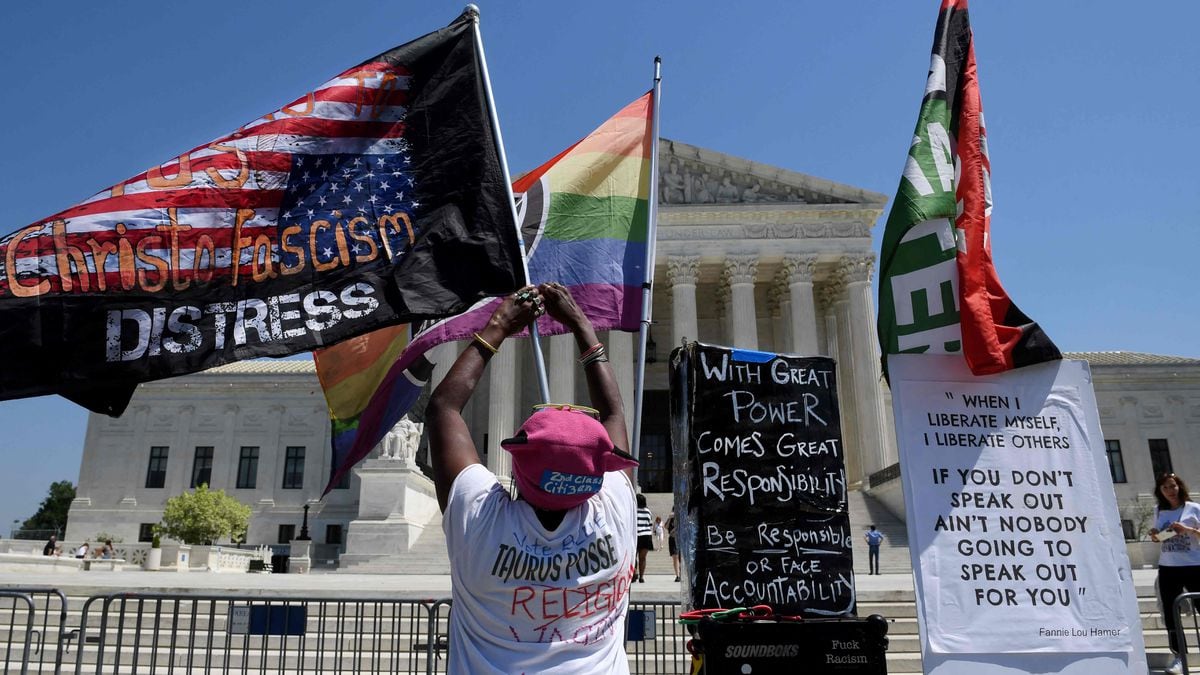Concentration in front of the Supreme Court after learning of the sentence that sentenced the five members of La Manada to 15 years in prison for a continued crime of rape, in June 2019.Kiko Huesca (EFE)
The Supreme Court will face in May the first appeals of the Prosecutor's Office against reductions in final sentences for sexual offenders decreed in application of the
law of only yes is yes
.
It will be the first time that the high court has ruled on these assumptions and sources of the Second Chamber (Criminal) consider it probable that some reductions agreed so far by the provincial courts will be revoked.
The matter generates discrepancies within the court, since there are magistrates who defend a criterion similar to that of the Prosecutor's Office —not to reduce the sentence provided that the one imposed with the previous law continues within the range provided for that crime in the new norm—, while that others consider that this interpretation should be exceptional because it conflicts with the legal principle that obliges the criminal to apply the most favorable criminal law retroactively.
The Supreme Court has already ruled thirty times on how to apply the law on sexual freedom, and on at least a dozen it has decided to lower the sentence.
But all these pronouncements have been about sentences that were not final when the new norm entered into force.
These were sentences that had been appealed in cassation before the high court, but, as the law changed before the Supreme Court came to examine them, the magistrates have already had to resolve this appeal taking into account the penalties established in the law of the
sole Yes is yes.
The scenario that is opening now is different because the Supreme Court already has appeals on the table —around a hundred, according to sources from the Prosecutor's Office— against reviews of final sentences agreed by the provincial courts or the superior courts of justice as a result of the entry in force of the
law of only yes is yes.
And although the Supreme Court in the first sentences in which it had to rule on the new law did point out that the sentence reductions were "mandatory" both for firm convictions and for those that are not, in several of its latest resolutions it has qualified this affirmation and has slipped that the arrival of the resources on final sentences will require setting a new criterion.
This was anticipated in a sentence dated February 2, in which the sentence imposed by the Navarre Court on a man for illegal detention, sexual assault, mistreatment and threats against his ex-partner was reduced from 16 to 14 years in prison.
"In reality, we are not dealing with a case of review of a final sentence, but in the process of appeal, in which our discretion fully plays when it comes to individualizing the sentence in question," says the sentence, of which Judge Ángel Hurtado was the speaker.
In subsequent resolutions, the court has made progress in this reflection: "We are not dealing with a case of review of final judgments, but in the direct application of the new law as the new law entered into force pending the appeal of cassation.
The court goes one step further in another sentence signed the same day in which it reduced the sentence of the attacker of a woman in Valencia from 13 to 10 years in prison because the new law was more favorable.
In that resolution, for which magistrate Miguel Colmenero was a speaker, the room refers to the fact that the law of
only yes is yes
lacks a transitory provision, similar to the one included in the Penal Code reform of 1995, that establishes how final sentences are to be reviewed.
"Leaving aside the doctrinal controversy about the possibility of direct application of these norms, specifically oriented to the application of Organic Law 10/1995, to the application of other subsequent norms, it is possible to attend to the criteria contained therein, reiterated in subsequent modifications of the Penal Code itself", points out the room, which adds: "From said criterion (...) it follows, first of all, that, in order to establish which is the most favorable provision, the penalty that corresponds to the fact prosecuted with the application of the complete norms of one or the other Code (or of one or the other law, if it is understood more generally).
Besides,
This is the criterion that the Prosecutor's Office also defends for the
only yes is yes law
, which considers that the fact that the new norm does not contain transitional provisions that incorporate this rule "in no way alters the possibility of applying said criterion."
The prosecutor's circular includes several Supreme Court rulings in which it ruled that, in the absence of a transitional provision in a penal reform, the one included in the previous reform can be used.
strict enforcement
The Criminal Chamber has already set for May the deliberation of the first two appeals of the Prosecutor's Office on reductions in sentences in final sentences, and sources in the chamber admit that there are discrepancies between the magistrates, for which reason the debate to set criteria is expected to be intense. .
There is a sector of the Supreme Court that, in line with the public ministry, maintains that the transitory provision of 1995 must be strictly applied, which would imply revoking many of the reductions in sentences decreed by the higher courts and hearings.
Another sector, on the other hand, considers that this criterion cannot be applied because although the punishment imposed with the previous Penal Code can be imposed with the new one, it may not be proportional.
"Arithmetic taxability is one thing and legal taxability another," say sources in the room.
The magistrates who disagree with the Prosecutor's Office also consider that the transitory provision cannot be applied as it is because it is a "repeal" of article 2.2 of the Penal Code, which includes that the retroactivity of the law is more favorable to the prisoner.
These judges maintain that this transitory provision was justified in its day because the Criminal Code had been changed almost in its entirety, which made it necessary to review hundreds of thousands of cases, for which reason it was decided to establish an exceptional rule to facilitate the work of the judges.
But this sector defends that a rule that harms the prisoner cannot be adopted now if the legislator has not left it so stated in the new law.
This interpretation, the sources point out, does not imply either that the Supreme Court will lower all the penalties that can be reduced with the new law,
Subscribe to continue reading
Read without limits
Keep reading
I'm already a subscriber





/cloudfront-eu-central-1.images.arcpublishing.com/prisa/OADNJHA33STDSSDCLLQNLNFBWQ.jpg)



